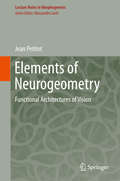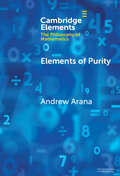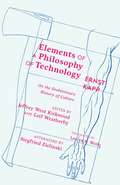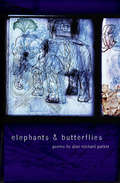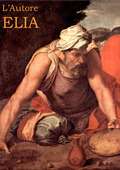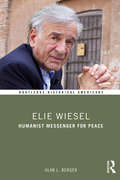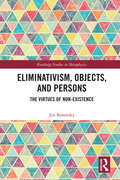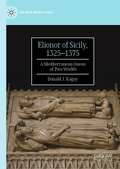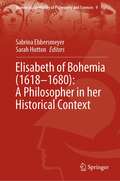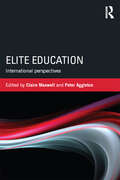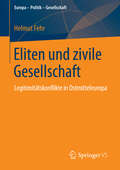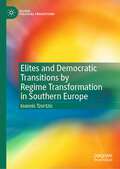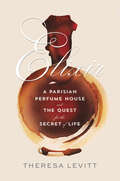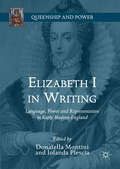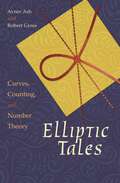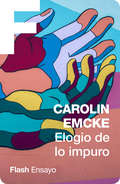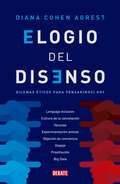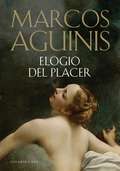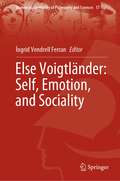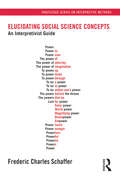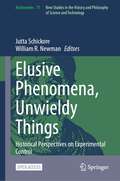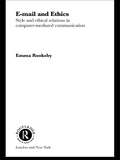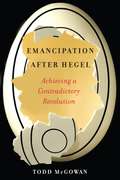- Table View
- List View
Elements of Neurogeometry
by Jean PetitotThis book describes several mathematical models of the primary visual cortex, referring them to a vast ensemble of experimental data and putting forward an original geometrical model for its functional architecture, that is, the highly specific organization of its neural connections. The book spells out the geometrical algorithms implemented by this functional architecture, or put another way, the "neurogeometry" immanent in visual perception. Focusing on the neural origins of our spatial representations, it demonstrates three things: firstly, the way the visual neurons filter the optical signal is closely related to a wavelet analysis; secondly, the contact structure of the 1-jets of the curves in the plane (the retinal plane here) is implemented by the cortical functional architecture; and lastly, the visual algorithms for integrating contours from what may be rather incomplete sensory data can be modelled by the sub-Riemannian geometry associated with this contact structure. As such, it provides readers with the first systematic interpretation of a number of important neurophysiological observations in a well-defined mathematical framework. The book's neuromathematical exploration appeals to graduate students and researchers in integrative-functional-cognitive neuroscience with a good mathematical background, as well as those in applied mathematics with an interest in neurophysiology.
Elements of Purity (Elements in the Philosophy of Mathematics)
by Andrew AranaA proof of a theorem can be said to be pure if it draws only on what is 'close' or 'intrinsic' to that theorem. In this Element we will investigate the apparent preference for pure proofs that has persisted in mathematics since antiquity, alongside a competing preference for impurity. In Section 1, we present two examples of purity, from geometry and number theory. In Section 2, we give a brief history of purity in mathematics. In Section 3, we discuss several different types of purity, based on different measures of distance between theorem and proof. In Section 4 we discuss reasons for preferring pure proofs, for the varieties of purity constraints presented in Section 3. In Section 5 we conclude by reflecting briefly on purity as a preference for the local and how issues of translation intersect with the considerations we have raised throughout this work.
Elements of a Philosophy of Technology: On the Evolutionary History of Culture (Posthumanities #99)
by Ernst KappThe first philosophy of technology, constructing humans as technological and technology as an underpinning of all culture Ernst Kapp was a foundational scholar in the fields of media theory and philosophy of technology. His 1877 Elements of a Philosophy of Technology is a visionary study of the human body and its relationship with the world that surrounds it. At the book&’s core is the concept of &“organ projection&”: the notion that humans use technology in an effort to project their organs to the outside, to be understood as &“the soul apparently stepping out of the body in the form of a sending-out of mental qualities&” into the world of artifacts.Kapp applies this theory of organ projection to various areas of the material world—the axe externalizes the arm, the lens the eye, the telegraphic system the neural network. From the first tools to acoustic instruments, from architecture to the steam engine and the mechanic routes of the railway, Kapp&’s analysis shifts from &“simple&” tools to more complex network technologies to examine the projection of relations. What emerges from Kapp&’s prophetic work is nothing less than the emergence of early elements of a cybernetic paradigm.
Elements of the Philosophy of Right
by Georg Wilhelm Friedrich HegelThis book is a translation of a classic work of modern social and political thought. Elements of the Philosophy of Right, Hegel's last major published work, is an attempt to systematize ethical theory, natural right, the philosophy of law, political theory, and the sociology of the modern state into the framework of Hegel's philosophy of history. Hegel's work has been interpreted in radically different ways, influencing many political movements from far right to far left, and is widely perceived as central to the communitarian tradition in modern ethical, social, and political thought. This edition includes extensive editorial material informing the reader of the historical background of Hegel's text, and explaining his allusions to Roman law and other sources, making use of lecture materials which have only recently become available. The new translation is literal, readable, and consistent, and will be informative and scholarly enough to serve the needs of students and specialists alike.
Elephants & Butterflies (American Poets Continuum #111)
by Alan Michael ParkerElephants & Butterflies combines the imaginative forays of The Vandals with the more meditative approach of Love Song with Motor Vehicles. Both wild and calm, boisterous and quiet, the poems in Elephants & Butterflies use surprise, song, and startling metaphor while allowing the ideas to simmer just below the surface of the lyric. The poems manage the difficult task of being highly readable and accessible, while still containing complex philosophical and personal knowledge.Alan Michael Parker (www.amparker.com) teaches at Davidson College in Davidson, North Carolina. He also teaches at Queens University, where he is core faculty in the low-residency MFA program.
Elia
by Alfonso Colmenares Domenico RiccioUn escrito arcaico; un cuento implacable, lento y denso de un sueño; una novela inteligente, desprovisto de la historia y el desarrollo narrativo, circular y sin movimiento y sin embargo sugerente, llena de un caleidoscopio semántico, es decir, marcado con la cadena y la mezcla en lugar de a la lista y la descripción, en prosa rítmica y un canto, hermético y expresionista; un libro escrito sobre la roca; pura y simple; sin principio y sin fin; eterno.
Elie Wiesel: Humanist Messenger for Peace (Routledge Historical Americans)
by Alan L. BergerElie Wiesel: Humanist Messenger for Peace is part biography and part moral history of the intellectual and spiritual journey of Elie Wiesel, a Holocaust survivor, human rights activist, author, university professor, and Nobel Peace Prize winner. In this concise text, Alan L. Berger portrays Wiesel’s transformation from a pre-Holocaust, deeply God-fearing youth to a survivor of the Shoah who was left with questions for both God and man. An advisor to American presidents of both political parties, his nearly 60 books voiced an activism on behalf of oppressed people everywhere. The book illuminates Wiesel’s contributions in the areas of religion, human rights, literature, and Jewish thought to show the impact that he has had on American life. Supported by primary documents about and from Wiesel, the volume gives students a gateway to explore Wiesel’s incredible life. This book will make a great addition to courses on American religious or intellectual thought.
Eliminativism, Objects, and Persons: The Virtues of Non-Existence (Routledge Studies in Metaphysics)
by Jiri BenovskyIn Eliminativism, Objects, and Persons, Jiri Benovsky defends the view that he doesn't exist. In this book, he also defends the view that this book itself doesn't exist. But this did not prevent him to write the book, and although in Benovsky's view you don't exist either, this does not prevent you to read it. Benovsky defends a brand of non-exceptionalist eliminativism. Some eliminativists, typically focusing on ordinary material objects such as chairs and hammers, make exceptions, for instance for blue whales (that is, living beings) or for persons (that is, conscious organisms). Benovsky takes one by one all types of allegedly existing objects like chairs, whales, and persons and shows that from the metaphysical point of view they are more trouble than they are worth—we are much better off without them. He thus defends an eliminativist view about ordinary objects as well as the 'no-Self' view, where he explores connections between metaphysics, phenomenology, and Buddhist thought. He then also considers the case of aesthetic objects, focusing on musical works and photographs, and shows that the claim of their non-existence solves the many problems that arise when one tries to find an appropriate ontological category for them, and that such an eliminativist view is more natural than what we might have thought. The arguments provided here are always topic-specific: each type of entity is given its own type of treatment, thus proving a varied and solid foundation for a generalized, non-exceptionalist, full-blown eliminativist worldview.
Elionor of Sicily, 1325–1375: A Mediterranean Queen of Two Worlds (The New Middle Ages)
by Donald J. KagayElionor of Sicily, 1325–1375: A Mediterranean Queen’s Life of Family, Administration, Diplomacy, and War follows Elionor of Sicily, the third wife of the important Aragonese king, Pere III. Despite the limited amount of personal information about Elionor, the large number of Sicilian, Catalan, and Aragonese chronicles as well as the massive amount of notarial evidence drawn from eastern Spanish archives has allowed Donald Kagay to trace Elionor’s extremely active life roles as a wife and mother, a queen, a frustrated sovereign, a successful administrator, a supporter of royal war, a diplomat, a feudal lord, a fervent backer of several religious orders, and an energetic builder of royal sites. Drawing from the correspondence between the queen and her husband, official papers and communiques, and a vast array of notarial documents, the book casts light on the many phases of the queen’s life.
Elisabeth of Bohemia (Women in the History of Philosophy and Sciences #9)
by Sarah Hutton Sabrina EbbersmeyerThis book showcases Elisabeth of Bohemia, Princess Palatine (1618-1680), one of the foremost female minds of the 17th century. Best known today for her important correspondence with the philosopher René Descartes, Elisabeth was famous in her own time for her learning, philosophical acumen, and mathematical brilliance. She was also well-connected in the seventeenth-century intellectual circles. Elisabeth’s status as a woman philosopher is emblematic of both the possibilities and limitations of women's participation in the republic of letters and of their subsequent fate in history. Few sources containing her own views survive, and until recently there has been no work on Elisabeth as a thinker in her own right. This volume brings together an international team of scholars to discuss her work from a cross-disciplinary perspective on the occasion of her fourth centenary. It is the first collection of essays to examine a range of her interests and to discuss them in relation to her historical context. The studies presented here discuss her educational background, her friendships and contacts, her interest in politics, religion, and astronomy, as well as her views on politics, her moral philosophy and her engagement with Cartesianism. The volume will appeal to historians of philosophy, historians of political thought, philosophers, feminists and seventeenth-century historians.
Elite Education: International perspectives
by Peter Aggleton Claire MaxwellElite Education – International Perspectives is the first book to systematically examine elite education in different parts of the world. Authors provide a historical analysis of the emergence of national elite education systems and consider how recent policy and economic developments are changing the configuration of elite trajectories and the social groups benefiting from these. Through country-level case studies, this book offers readers an in-depth account of elite education systems in the Anglophone world, in Europe and in the emerging financial centres of Africa, Asia and Latin America. A series of commentaries highlight commonalities and differences between elite education systems, and offer insights into broader theoretical issues, with which educationalists, researchers and policy makers are engaging . With authors including Stephen J. Ball, Donald Broady, Rubén Gaztambide-Fernández, Heinz-Hermann Krüger, Maria Alice Nogueira, Julia Resnik and Agnès van Zanten, the book offers a benchmark perspective on issues frequently glossed over in comparative education, including the processes by which powerful groups retain privilege and ‘elite’ status in rapidly changing societies. Elite Education – International Perspectives will appeal to policy makers and academics in the fields of education and sociology. Simultaneously it will be of special relevance to post-graduates enrolled on courses in the sociology of education, education policy, and education and international development.
Eliten und zivile Gesellschaft
by Helmut FehrIn dieser Studie werden Eliten in Ostmitteleuropa unter vergleichenden Gesichtspunkten untersucht. Das Spektrum der Eliten reicht von den kommunistischen Führungsgruppen bis zu neuen Machteliten und Gegeneliten, der Untersuchungszeitraum von 1968 bis 2013. Auf breiter empirischer Basis (ausführliche Interviews, Dokumente, Printmedien) beleuchtet der Autor den Elitenwandel in Polen, der Tschechischen Republik und der DDR/Ostdeutschland. Dabei geht es um ein tieferes Verständnis der Demokratisierung, der Elitenbildung und der Legitimitätskonflikte vor und nach den revolutionären Umbrüchen von 1989.
Elites and Democratic Transitions by Regime Transformation in Southern Europe (Global Political Transitions)
by Ioannis TzortzisThis book examines three cases of democratic transitions by self-transformation of the non-democratic regimes in Southern Europe—the Spanish reforma pactada-ruptura pactada of 1976-77, the Greek “Markezinis experiment” of 1973, and the Turkish democratic transition of 1983—in a comparative perspective. The author argues that a democratic transition initiated by the regime elites is, in contrast to widely held assumptions and notwithstanding some reservations on whether democracy can be (re-)introduced by non-democrats, worth viewing as a “window of opportunity” for democratisation. It is up to the democratic counter-elites to respond to it, using the civil society and the international factor as allies to achieve their goal of acquiring more concessions from the regime.
Elixir: A Parisian Perfume House and the Quest for the Secret of Life
by Theresa LevittA story of alchemy in Bohemian Paris, where two scientific outcasts discovered a fundamental distinction between natural and synthetic chemicals that inaugurated an enduring scientific mystery.For centuries, scientists believed that living matter possessed a special quality—a spirit or essence—that differentiated it from nonliving matter. But by the nineteenth century, the scientific consensus was that the building blocks of one were identical to the building blocks of the other. Elixir tells the story of two young chemists who were not convinced, and how their work rewrote the boundary between life and nonlife.In the 1830s, Édouard Laugier and Auguste Laurent were working in Laugier Père et Fils, the oldest perfume house in Paris. By day they prepared the perfumery’s revitalizing elixirs and rejuvenating eaux, drawing on alchemical traditions that equated a plant’s vitality with its aroma. In their spare time they hunted the vital force that promised to reveal the secret to life itself. Their ideas, roundly condemned by established chemists, led to the discovery of structural differences between naturally occurring molecules and their synthetic counterparts, even when the molecules were chemically identical.Scientists still can’t explain this anomaly, but it may point to critical insights concerning the origins of life on Earth. Rich in sparks and smells, brimming with eccentric characters, experimental daring, and the romance of the Bohemian salon, Elixir is a fascinating cultural and scientific history.
Elizabeth I in Writing: Language, Power And Representation In Early Modern England (Queenship and Power)
by Donatella Montini Iolanda PlesciaThis collection investigates Queen Elizabeth I as an accomplished writer in her own right as well as the subject of authors who celebrated her. With innovative essays from Brenda M. Hosington, Carole Levin, and other established and emerging experts, it reappraises Elizabeth’s translations, letters, poems and prayers through a diverse range of approaches to textuality, from linguistic and philological to literary and cultural-historical. The book also considers Elizabeth as “authored,” studying how she is reflected in the writing of her contemporaries and reconstructing a wider web of relations between the public and private use of language in early modern culture. Contributions from Carlo M. Bajetta, Guillaume Coatelen and Giovanni Iamartino bring the Queen’s presence in early modern Italian literary culture to the fore. Together, these essays illuminate the Queen in writing, from the multifaceted linguistic and rhetorical strategies that she employed, to the texts inspired by her power and charisma.
Elliptic Tales: Curves, Counting, and Number Theory
by Robert Gross Avner AshA look at one of the most exciting unsolved problems in mathematics todayElliptic Tales describes the latest developments in number theory by looking at one of the most exciting unsolved problems in contemporary mathematics—the Birch and Swinnerton-Dyer Conjecture. In this book, Avner Ash and Robert Gross guide readers through the mathematics they need to understand this captivating problem.The key to the conjecture lies in elliptic curves, which may appear simple, but arise from some very deep—and often very mystifying—mathematical ideas. Using only basic algebra and calculus while presenting numerous eye-opening examples, Ash and Gross make these ideas accessible to general readers, and, in the process, venture to the very frontiers of modern mathematics.
Elogio de lo impuro
by Carolin EmckeUn brillante elogio de la diversidad y pluralidad en las sociedades. Para poder luchar contra el racismo y fanatismo, Carolin Emcke (Contra el odio, Taurus) defiende la necesidad de construir un nosotros que nos incluya a todos, independientemente de la sexualidad, religión o procedencia. Ya que, sin duda, es esta pluralidad la que garantiza la libertad individual de todos. «Si una sociedad liberal quiere defenderse, sólo lo logrará mientras siga siendo liberal y abierta.»
Elogio del disenso: Dilemas éticos para pensar(nos) hoy
by Diana Cohen AgrestCon la mirada puesta en la capacidad transformadora del disenso, Diana Cohen Agrest despliega los dilemas éticos de hoy y recupera el fascinante ejercicio de confrontar argumentos. Sin duda, el libro más provocativo del momento, cuando se impone pensar con nuevas premisas y herramientas el complejo mundo en el que vivimos. ¿Es posible asumir posiciones comprehensivas sobre los dilemas más urgentes de nuestro tiempo cuando naturalizamos la radicalización del conflicto y la oposición? La época parece sugerir que se trata de un ideal impracticable; este libro, en cambio, demuestra que la diversidad puede ser el mejor sustrato para el cultivo del pensamiento crítico y la reflexión. En efecto, con la mirada puesta en la capacidad transformadora del disenso, Diana Cohen Agrest despliega los dilemas éticos de hoy y recupera el fascinante ejercicio de confrontar argumentos. ¿Puede el lenguaje inclusivo aportar a la equidad de género? ¿La cultura de la cancelación deriva en justicia o en linchamiento digital? ¿Debe ser optativa u obligatoria la vacunación? ¿Es moralmente admisible experimentar con animales para estudiar las enfermedades humanas? ¿Es posible compatibilizar objeción de conciencia y acceso a los servicios de salud? ¿Vivimos una doble vida por obra y gracia del Big Data? ¿El ejercicio de la prostitución es resabio patriarcal o afirmación de la libertad? ¿Las drogas que mejoran el rendimiento son realmente contrarias al espíritu deportivo? Inquietante y lúcido en su construcción de una mirada ética, Elogio del disenso quizá sea el libro más provocativo del momento, cuando se impone pensar con nuevas premisas y herramientas el complejo mundo en el que vivimos.
Elogio del placer
by Marcos Aguinis«El placer apela a cualquier recurso, lícito o ilícito», dice el autor, y ese es el principio que rige este ensayo erudito, gozoso y dionisíaco. Contracara perfecta de «¡Pobre patria mía!», el libro más leído de 2009, examina los resortes del goce: el poder curativo del humor, los vericuetos del pecado, los encantos del carnaval, los claroscuros de la filosofía, la felicidad que entregan una buena biblioteca, el cine, el sexo, la pintura, el romance, el consumo y un poco más de sexo. A una propuesta misteriosa (aunque, a qué negarlo, saludable): «Marcos, ¡hacés bien en alejarte de las malas ondas! Querés escribir sobre cosas buenas, aunque sabemos que es más fácil referirse a las malas. No te achiques, no te sometas a la corriente. Atragantarse con lo malo corrompe la vida. De todo corazón, te acompaño en el desafío». Una respuesta contundente: «El placer no es irrelevante. Es concreto, cotidiano y alcanzable. Es una necesidad. Sin su titánico motor se detendría el mundo. Mueve al hombre. ¡Qué digo! ¡Mueve la vida!». Un libro que recorre el espinel del placer desde la inocencia hasta el peligro, desde el brío hasta la toxicidad, y que explica mejor que cualquier biografía quién es Marcos Aguinis.
Else Voigtländer: Self, Emotion, and Sociality (Women in the History of Philosophy and Sciences #17)
by Íngrid Vendrell FerranThis book is the first to offer a full account of the philosophical work of Else Voigtländer. Locating the sources of her thought in the philosophy and psychology of the nineteenth and twentieth19th and 20th centuries in figures such as Nietzsche and Lipps, the volume book uncovers and examines Voigtländer’s intellectual exchanges with both phenomenology and psychoanalysis. The major themes within her work are considered in 12 expertly written chapters that also cover more recent developments in the philosophy of self, emotion, and sociality. The book appeals to scholars who are interested in the history of philosophy, and in particular of phenomenology, as well as those working on the philosophical roots of psychology and in women's studies.
Elucidating Social Science Concepts: An Interpretivist Guide (Routledge Series on Interpretive Methods)
by Frederic Charles SchafferConcepts have always been foundational to the social science enterprise. This book is a guide to working with them. Against the positivist project of concept "reconstruction"—the formulation of a technical, purportedly neutral vocabulary for measuring, comparing, and generalizing—Schaffer adopts an interpretivist approach that he calls "elucidation." Elucidation includes both a reflexive examination of social science technical language and an investigation into the language of daily life. It is intended to produce a clear view of both types of language, the relationship between them, and the practices of life and power that they evoke and sustain. After an initial chapter explaining what elucidation is and how it differs from reconstruction, the book lays out practical elucidative strategies—grounding, locating, and exposing—that help situate concepts in particular language games, times and tongues, and structures of power. It also explores the uses to which elucidation can be put and the moral dilemmas that attend such uses. By illustrating his arguments with lively analyses of such concepts as "person," "family," and "democracy," Schaffer shows rather than tells, making the book both highly readable and an essential guide for social science research.
Elusive Phenomena, Unwieldy Things: Historical Perspectives on Experimental Control (Archimedes #71)
by Jutta Schickore William R. NewmanThis open access book provides a historical treatment of scientific control in experimentation in the longue durée. The introduction distinguishes four related strands in the history of experimental control: the development of practices to stabilize experimental conditions; the career of the comparative design; the unfolding of methodological discussions about control practices and designs; and the history of the term “control”. Each chapter brings these distinctions to bear on specific historical episodes. The focus is on experiments with complex, elusive phenomena such as perception and learning, irregular movements, and unobservable elements. Such experiments bring control issues to the fore because they are difficult to design and stabilize and often controversial. Together, the chapters show that the local context shapes what exactly is controlled, how control can be accomplished, and how controls are justified. They also show that control strategies and methodological ideas often remain stable for a long time and change only gradually. This book, as well as the volume on analysis and synthesis in experimentation by the same editors, contains contributions by an array of experts from multiple disciplines, making it suitable for historians and philosophers of science and students alike.
Email and Ethics: Style and Ethical Relations in Computer-Mediated Communications (Routledge Studies in Contemporary Philosophy)
by Emma RooksbyE-mail and Ethics explores the ways in which interpersonal relations are affected by being conducted via computer-mediated communication.The advent of this channel of communication has prompted a renewed investigation into the nature and value of forms of human association. Rooksby addresses these concerns in her rigorous investigation of the benefits, limitations and implications of computer-mediated communication.With its depth of research and clarity of style, this book will be of essential interest to philosophers, scholars of communication, cultural and media studies, and all those interested in the importance and implications of computer-mediated communication.
Emancipation After Hegel: Achieving a Contradictory Revolution
by Todd McGowanHegel is making a comeback. After the decline of the Marxist Hegelianism that dominated the twentieth century, leading thinkers are rediscovering Hegel’s thought as a resource for contemporary politics. What does a notoriously difficult nineteenth-century German philosopher have to offer the present? How should we understand Hegel, and what does understanding Hegel teach us about confronting our most urgent challenges?In this book, Todd McGowan offers us a Hegel for the twenty-first century. Simultaneously an introduction to Hegel and a fundamental reimagining of Hegel’s project, Emancipation After Hegel presents a radical Hegel who speaks to a world overwhelmed by right-wing populism, authoritarianism, neoliberalism, and economic inequalities. McGowan argues that the revolutionary core of Hegel’s thought is contradiction. He reveals that contradiction is inexorable and that we must attempt to sustain it rather than overcoming it or dismissing it as a logical failure. McGowan contends that Hegel’s notion of contradiction, when applied to contemporary problems, challenges any assertion of unitary identity as every identity is in tension with itself and dependent on others. An accessible and compelling reinterpretation of an often-misunderstood thinker, this book shows us a way forward to a new politics of emancipation as we reconcile ourselves to the inevitability of contradiction and find solidarity in not belonging.
Emancipation and Illusion: Rationality and Gender in Habermas's Theory of Modernity
by Marie FlemingIn this comprehensive analysis of Jürgen Habermas's philosophy and social theory, Marie Fleming takes strong issue with Habermas over his understanding of rationality and the lifeworld, emancipation, history, and gender. Throughout the book she focuses attention on the various ways in which an idea of emancipation motivates and shapes his universalist theory and how it persists over several major changes in methodology. Her critique of Habermas begins from the view that universalism has to include a vision of gender equality, and she asks why Habermas, despite deeply held concerns about equality and inclusiveness, repeatedly and systematically relegates matters of gender to secondary status in his social and moral theory. She extends her critique to a range of issues in his theory of rationality and examines what she views as his very problematical claims about truthfulness, art, and bourgeois intimacy.The point of Fleming's critique of Habermas is not to dispute universalism, but to build on the key universalist principles of inclusiveness and equality. She is not persuaded by the view, shared by both sympathizers of Habermas and his postmodern critics, that to be for or against Habermas is to be for or against universalism. Her intention rather is to show that Habermas's theory of modernity is so structured that it cannot achieve its universalist aims. Contending that his theory is not universalist enough, she claims that universalism has to be reconceived as a radical, critical, and historical project.
